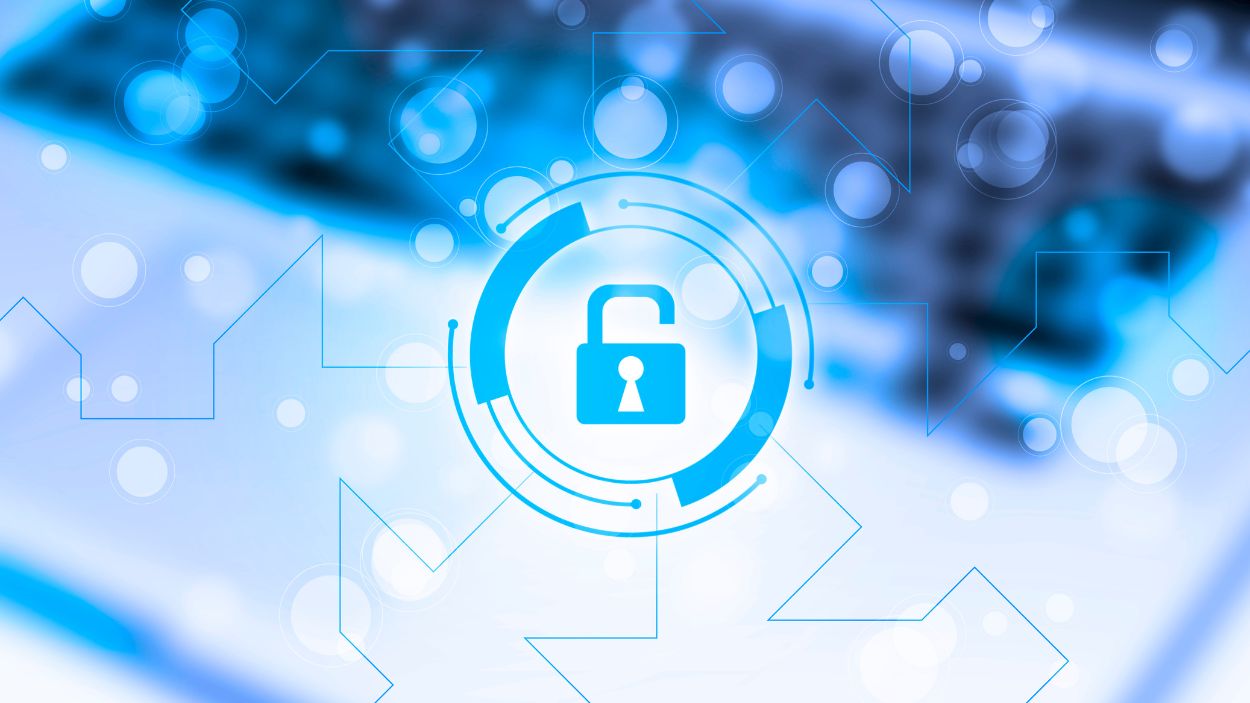Contents:
Small and medium businesses must prioritize cybersecurity to avoid financial, legal, and reputational risks. Using a unified cybersecurity platform or partnering with an MSSP offers effective, cost-efficient protection for endpoints and networks.
This article will help you make an informed decision between the two solutions.
Why is cybersecurity important for small businesses
Small businesses are increasingly becoming targets for cybercriminals. So, cybersecurity is becoming a concern for them too. While SMBs have fewer defense tools than large enterprises, they still hold sensitive data, making them a target for hackers.
Cyberattacks can lead to devastating consequences:
- financial losses
- legal liabilities
- irreparable damage to your business reputation
SMBs often lack the resources to recover from such attacks. This means the impact can be even more severe compared to larger organizations.
Why are SMBs interesting targets for cybercriminals
Picture your business as a small but valuable jewel. Cybercriminals, like pickpockets, often go after these “easier” targets, knowing they may lack sophisticated security measures. Many small businesses operate under the false assumption that they are too small to attract hackers’ attention. This misconception makes them easy targets.
Additionally, SMBs may hold valuable data, such as customer information and financial records. That’s an interesting asset for cybercriminals.
However, the increase in cyberattacks targeting SMBs has another strong reason. Cybercriminals now use automated tools for vulnerability scanning. These tools don’t check business size.
Hackers will automatically use their exploit kits on any organization vulnerable to a certain flaw. Small and medium businesses that overlook patching and threat detection are the first to fall victim to widespread attacks, like SQL injection or brute force.
For small and medium-sized businesses, choosing the right cybersecurity solution is crucial to protecting sensitive data without overwhelming resources. To help with your decision, we’ve included a video comparison of CrowdStrike vs. SentinelOne.
This side-by-side analysis examines the strengths and weaknesses of both platforms, offering insights into which might be the better fit for your SMB, based on factors like ease of use, scalability, and cost-effectiveness.
Main risks in case of a cyberattack
Financial Losses
The financial consequences of a cyberattack can be overwhelming. According to the Verizon 2023 Data Breach Investigations Report, the median cost per ransomware attack reached $46,000. Ransomware now accounts for 32% of all breaches. This figure doesn’t include hidden costs, such as potential loss of business and customer trust.
Legal Liabilities
Beyond the direct financial costs, SMBs also face potential legal liabilities. Regulatory fines can pile up if your business fails to comply with data protection laws. Imagine losing money to both hackers and authorities for not protecting your customers’ data.
Reputation Damage
A cyberattack can tarnish your reputation, making customers hesitant to do business with you. According to various studies, customers are less likely to trust SMBs that have experienced a data breach, leading to lost sales and a damaged brand image.
Essential Cybersecurity Tools for SMBs
Small business owners need a robust set of tools to defend against cyber threats at a price they can afford and with minimal human intervention.
Firewalls
Consider these your business’s digital gatekeepers, blocking unauthorized access. A firewall acts as the first line of defense for your business by filtering incoming and outgoing network traffic.
Next Generation Antivirus (NGAV)
These are more advanced than traditional antivirus software. NGAVs are effective for detecting and neutralizing even sophisticated cyber threats. Compared to traditional solutions, they analyze the behavior of files and processes to identify suspicious activity, even if it’s unknown. Regular antivirus solutions are only effective for protecting against known threats.
Multi-Factor Authentication (MFA)
MFA adds an extra layer of security by requiring multiple forms of identity checking. Think of this as an extra lock on your front door, double-checking who gains access.
Password Management
Password management tools store your keys (passwords), ensuring they don’t fall into the wrong hands. These tools also allow small and medium businesses to create as many strong passwords as possible without having to remember any.
Endpoint Detection and Response
EDRs monitor your digital premises for suspicious activities like a vigilant security camera. They typically provide continuous monitoring and response to potential threats on your endpoints.
DNS Security
DNS Security tools prevent hackers from redirecting your web traffic to malicious sites. They can also detect malicious communication attempts and block them before they can do any harm.
Ransomware Encryption Protection
Ransomware Encryption Protection (REP) detects and blocks data encryption attempts.
Automated Patch Management
Automated patch management closes security gaps by automatically updating software with the latest security patches.
Privileged Access Management
Privileged Access Management (PAM) solutions control and monitor access to critical systems and data. You can use them to monitor, escalate and de-escalate privileges.
Email Security
Email security tools protect against threats like phishing. In 2023, the median time for users to fall for phishing emails was less than 60 seconds. Phishing attempts can result in credential stealing and malware deployment. Did you know that Heimdal was nominated Anti-Malware solution of the year?
Remote Desktop
As small and medium businesses continue to adopt remote work, the need to allow employees to access data and apps via a virtual private network or remote desktop rises. Remote Desktop Security secures remote access, ensuring only authorized users can log in.
The 4 types of cybersecurity solutions for SMBs
Small and medium businesses have various ways of dealing with their cybersecurity needs. Most are restrained by budget and have few to no IT security trained employees. Depending on their industry compliance goals, infrastructure complexity, and resources, they often choose one of the following solutions.
Implementing a unified cybersecurity platform
A unified cybersecurity platform integrates various security tools into a single, cohesive solution. This approach simplifies management and provides better visibility across the entire network.
Heimdal’s XDR platform is a prime example of how unification enhances protection. According to Morten Kjaersgaard, Chairman and Founder of Heimdal, this XDR platform offers the “widest unified cybersecurity solution.”
Here’s more on why consolidating your cybersecurity tools adds value.
Advantages of a Unified Platform:
- Simplified Management: Centralized control and monitoring make it easy to manage even for a small IT team.
- Better Visibility: Holistic view of the entire network enables quick detection and response to threats.
- Seamless Integration: All the tools you need work together and communicate in real-time to prevent and contain potential incidents.
Partnering with a Managed Security Service Provider (MSSP):
An MSSP offers 24/7 monitoring, expert knowledge, and scalable security solutions. By partnering with an MSSP, small businesses can effectively manage and mitigate cyber risks without paying and training an in-house IT team.
Benefits of Partnering with an MSSP:
- 24/7 Monitoring: Continuous network surveillance to detect and respond to threats in real time.
- Expert Knowledge: Access to cybersecurity professionals who can provide insights and recommendations.
- Scalable Solutions: Flexible services that can grow with the business.
Partnering with a Managed Service Provider (MSP)
An MSP manages your SMB’s IT infrastructure and addresses security concerns. Imagine having a dedicated team that handles your technology needs and ensures your business is protected from digital threats. This holistic approach ensures that all aspects of the business’s technology environment are secure and functioning efficiently.
Learn more about the MSP landscape.
Benefits of Partnering with an MSP:
- Comprehensive IT Management: Covers both IT infrastructure and cybersecurity, reducing the burden on internal teams.
- Proactive Security Measures: Regular updates and maintenance to prevent security vulnerabilities.
- Cost-Effective: Bundled services can be more economical than purchasing separate IT and security solutions.
Single-purpose tools
Using a mix of single-purpose tools from different brands and open-source software is usually less effective. Threat detection and incident response will work slower due to compatibility issues and a lack of communication between tools.
Top 7 cybersecurity solutions for small businesses
Choosing the right cybersecurity solution for your SMB can be daunting, but there’s a way to make things easier. Here’s a list of the best platforms that small and medium businesses can go for.
Heimdal® XDR
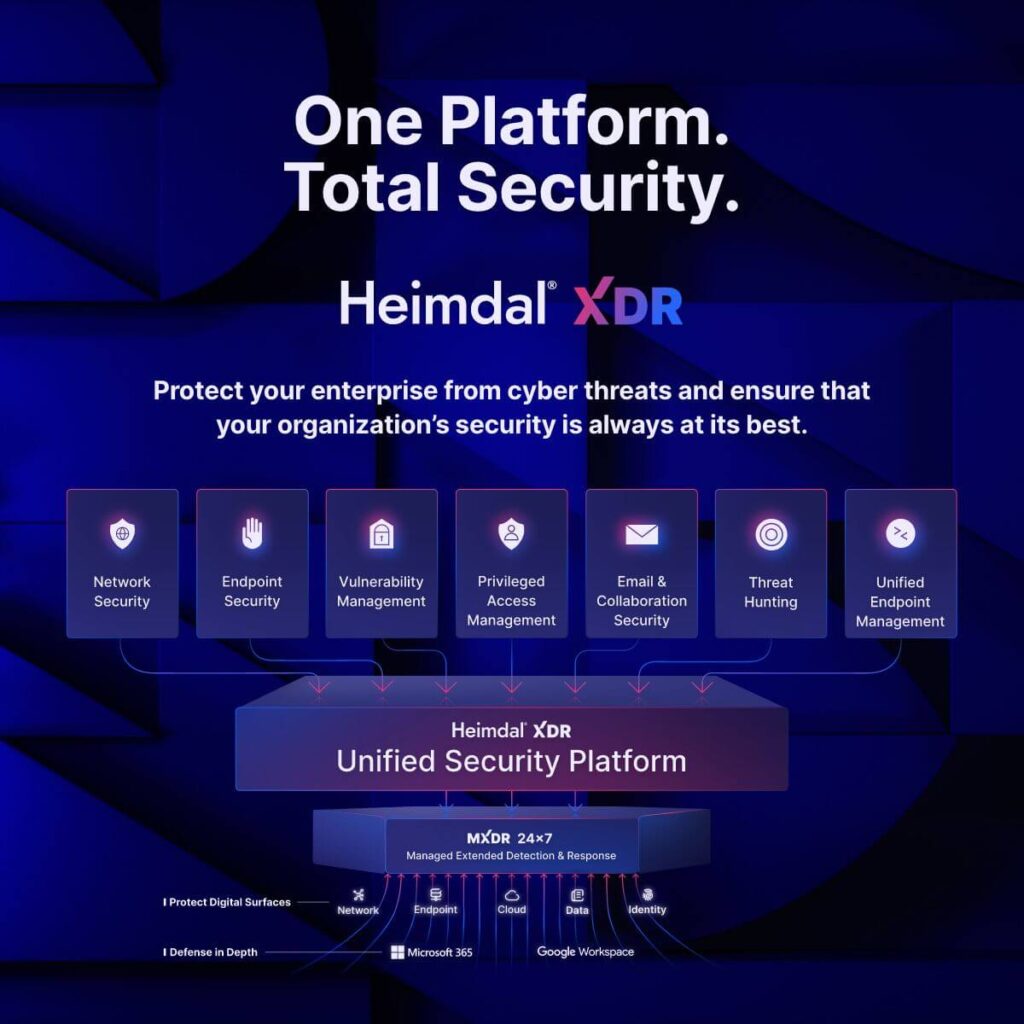
Heimdal offers a comprehensive XDR platform that provides endpoint and network security protection through advanced threat detection and automated response. With its modular design, Heimdal allows businesses to customize their security solutions to meet specific needs while ensuring seamless integration and maximum efficiency.
Main Features:
- Threat Prevention: Stops malware, ransomware, and other threats before they reach the network.
- Endpoint Protection: Continuous monitoring and response to threats on all devices.
- Patch Management: Automatically updates software to eliminate vulnerabilities.
Pros:
- Comprehensive Protection: Covers all aspects of cybersecurity, from prevention to response.
- Cost-Effective: Bundled services reduce the need for multiple tools.
- User-Friendly Interface: Easy to manage and monitor security across the network.
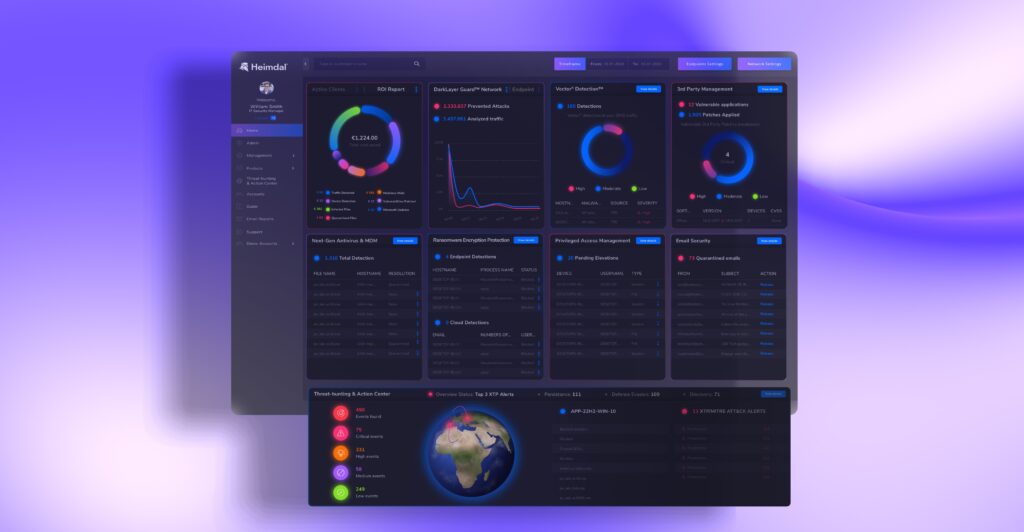
Cons:
- Initial Setup: This may require some time to integrate fully with existing systems.
- Learning Curve: Users may need time to become familiar with all features.
- Subscription Cost: Higher upfront cost compared to standalone tools.
Pricing:
Offers flexible pricing options with a free trial available.
Sophos
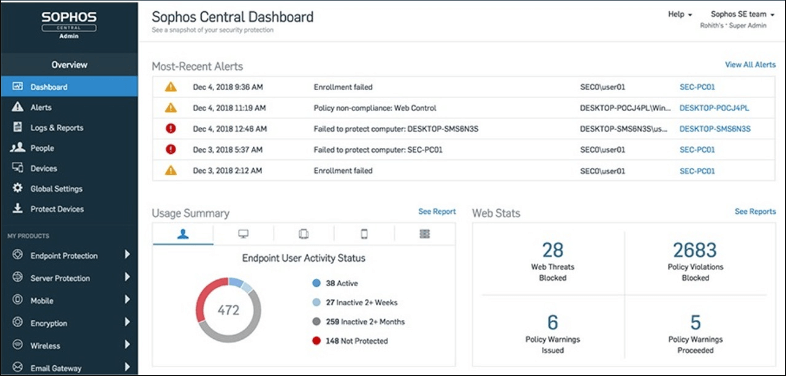
Sophos offers a complete cybersecurity package with antivirus software, firewall protection, and easy-to-use cloud management. It also uses AI to stop cyber-attacks and advanced threats, making it ideal for growing businesses.
Main Features:
- Endpoint Protection: Protects devices from malware, ransomware, and other threats.
- Managed Detection and Response: 24/7 monitoring and threat hunting.
- Firewall: Advanced network protection with intrusion prevention.
Pros:
- Comprehensive Coverage: Wide range of products for different security needs.
- Scalable: The package can adjust as the business grows.
- Strong Global Presence: Access to localized offerings and support across 6 continents.
Cons:
- Cost: Can be expensive for smaller businesses.
- Complex Setup: Requires technical expertise to configure.
- Subscription Model: Ongoing costs for managed services.
Pricing:
Sophos offers a free trial of its Unified Threat Management solution Pricing is only available upon request.
Sentinel One
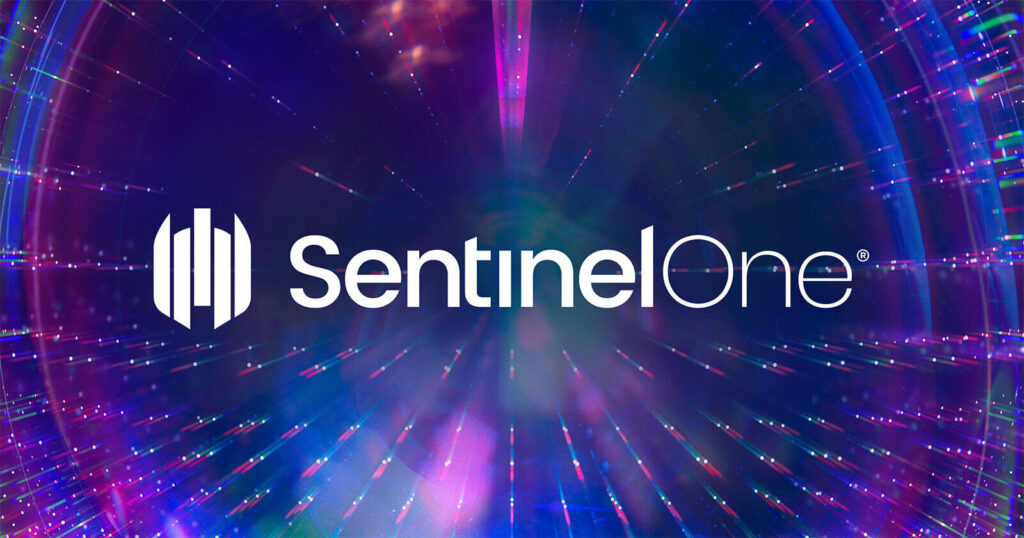
SentinelOne offers an AI-driven cybersecurity solution that provides real-time endpoint protection and automated threat resolution. Its autonomous capabilities allow businesses to respond to threats quickly and efficiently, reducing the risk of data breaches and minimizing downtime.
Main Features:
- AI-Driven Threat Detection: Uses artificial intelligence to identify and block threats.
- Endpoint Protection: Monitors and responds to threats on all connected devices.
- Automated Response: Takes immediate action to contain and eliminate threats.
Pros:
- Advanced AI Technology: High detection rates with minimal false positives.
- Ease of use: Many users commend SentinelOne’s ease of use as the top reason for choosing the platform.
- Scalable: Suitable for businesses of all sizes.
Cons:
- High Cost: Premium pricing for advanced features.
- Technical Complexity: Requires skilled personnel to manage.
- Limited Integration: May not integrate smoothly with other tools.
Pricing:
Premium pricing with customized quotes based on business needs.
TrendMicro
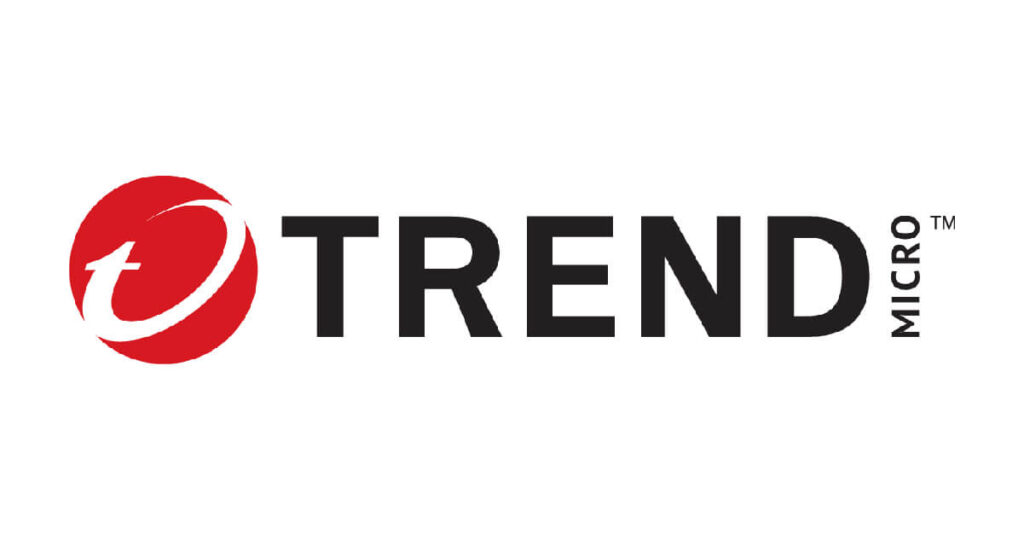
Trend Micro provides a multi-layered cybersecurity solution to protect endpoints, networks, and cloud environments. It is recognized for its advanced machine-learning capabilities, which help detect and block sophisticated threats.
This capability makes it ideal for businesses seeking a proactive defense strategy.
Main Features:
- Endpoint Security: Protects devices from a wide range of threats.
- Email Security: Filters phishing and other malicious emails.
- Network Defense: Monitors and protects the network from intrusions.
Pros:
- Comprehensive Suite: Offers protection across multiple areas.
- Strong Reputation: Trusted brand with a long history in cybersecurity.
- Easy to Use: User-friendly interface for small businesses.
Cons:
- Cost: Higher pricing for premium features.
- Limited Customization: Fewer options for advanced users.
- Support: Mixed reviews on customer support responsiveness.
Pricing:
The price varies depending on the package and the number of devices. A 30-day free trial and detailed demo are available. Pricing is available upon request.
McAfee (Trellix)
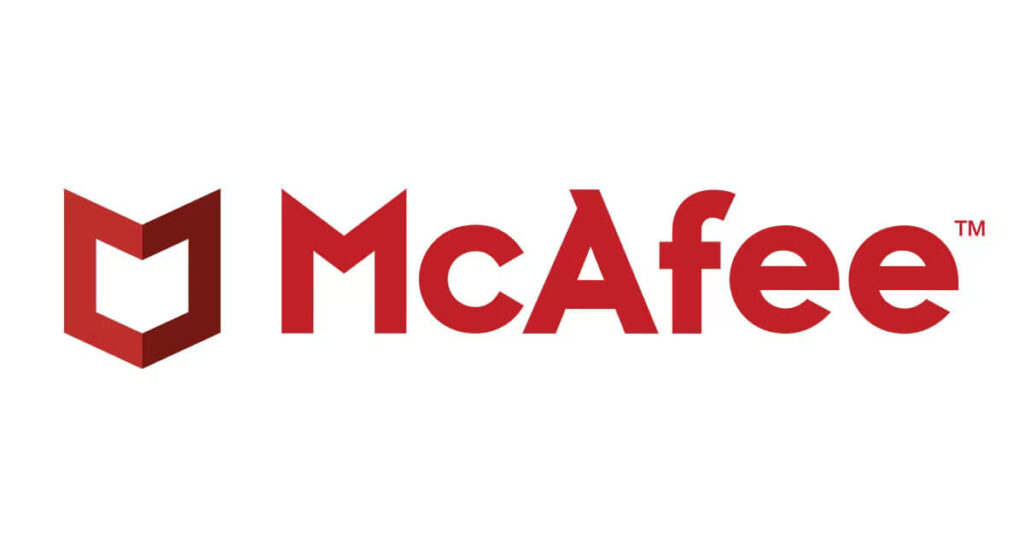
McAfee’s Trellix cybersecurity suite includes diverse tools, such as antivirus, endpoint protection, network security, email security, and cloud security, all managed through a centralized platform. Its robust threat intelligence and user-friendly interface make it popular for SMBs looking for comprehensive yet accessible security solutions.
Main Features:
- Antivirus: Detects and removes malware and other threats.
- Endpoint Protection: Protects all devices connected to the network.
- Cloud Security: Safeguards data stored in the cloud.
Pros:
- Trusted Brand: Long-standing reputation in the cybersecurity industry.
- Comprehensive Protection: Covers various aspects of security.
- Affordable: Competitive pricing for small businesses.
Cons:
- Resource-Intensive: May slow down devices.
- Complex Setup: Requires technical knowledge for full deployment.
- Limited Features: Some advanced features are only available in higher-tier plans.
Pricing:
Affordable pricing with various plans available.
Bitdefender (Gravity Zone)
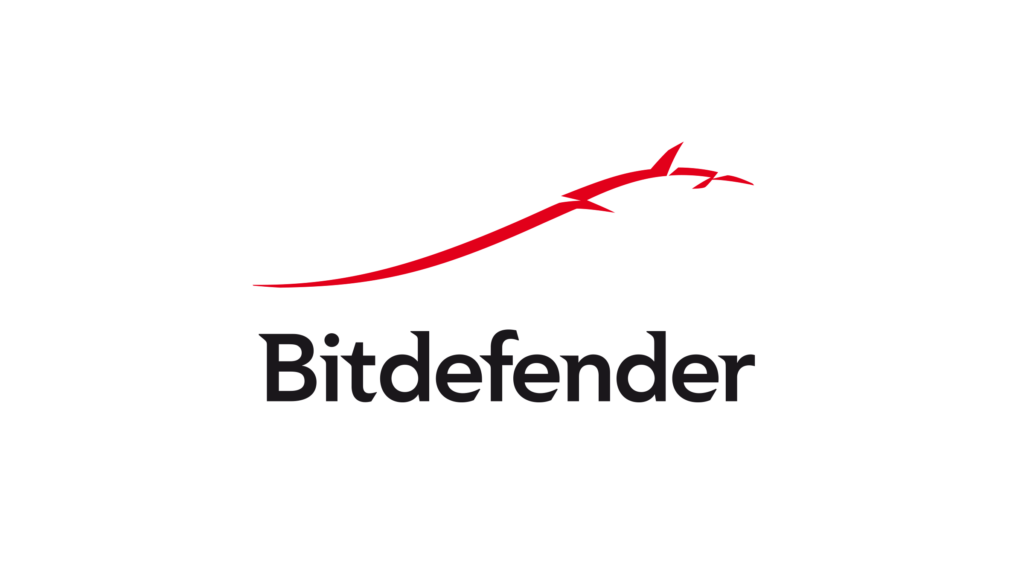
Bitdefender offers various cybersecurity products, like GravityZone, to businesses. It provides endpoint security, network defense, and advanced threat protection.
It is known for high detection rates and minimal impact on system performance. Overall, Bitdefender provides strong protection to SMBs without slowing down their operations.
Main Features:
- Antivirus: Real-time protection against malware and viruses.
- Endpoint Protection: Secures devices with advanced threat detection.
- Managed Detection and Response: 24/7 monitoring and incident response.
Pros:
- High Detection Rates: Excellent protection against a wide range of threats.
- User-Friendly: Easy to install and manage.
- Affordable: Competitive pricing for small businesses.
Cons:
- Limited Integration: It may not work seamlessly with other tools.
- Resource Usage: The solution can be demanding on system resources.
- Support: Limited support options for lower-tier plans.
Pricing:
Competitive pricing with discounts for multi-year plans. Plans are generally tiered based on the number of devices and years of coverage.
Cynet
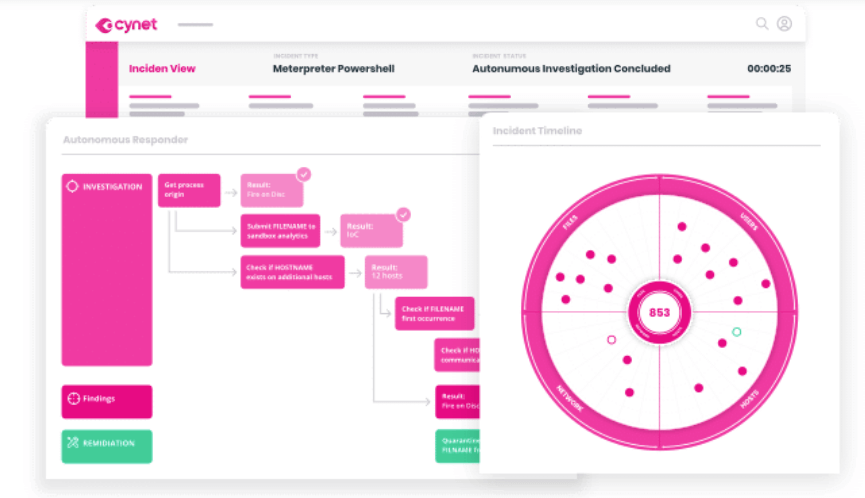
Cynet provides an all-in-one cybersecurity platform that integrates endpoint, network, and user protection into a single solution. Its automated threat detection and response features are particularly valuable for small and medium businesses with limited IT resources, offering high-level security without requiring extensive in-house expertise.
Main Features:
- Threat Detection: Identifies and blocks threats in real time.
- Automated Response: Quickly responds to security incidents.
- Security Automation: Streamlines security processes to reduce manual work.
Pros:
- All-in-One Solution: Comprehensive protection in a single platform.
- Cloud-based: Eliminates the need for on-premises hardware.
- Scalable: Suitable for growing businesses.
Cons:
- High Cost: Premium features come with a higher price tag.
- Complex Setup: This requires technical expertise to be fully implemented.
- Limited Customization: Fewer options for advanced users.
Pricing:
Premium pricing starts at $7 per endpoint, with tailored quotes based on business needs.
If you still need more detail, read our detailed guide on choosing the best XDR solution. It’s not customized according to a small business’s needs, but it will add more clarity and insights.
Cybersecurity tips for small businesses
To strengthen your overall security posture, consider the following best practices:
- Employee Training: In 2023, human error caused 68% of data breaches. Regular cybersecurity training can prevent mistakes and protect your business.
- Regular Software Updates: The WannaCry ransomware in 2017 exploited outdated Windows software, leading to massive disruption. Keep all software updated to avoid similar attacks.
- Data Encryption: Like larger enterprises, SMBs must start treating sensitive data as priceless assets. To protect sensitive data both at rest and in transit, they must encrypt it.
- Secure Backup Practices: Implement secure backup solutions to ensure data can be recovered in case of a breach or ransomware attack.
- Access Control: Implement access controls to restrict data access, following the principle of least privilege.
- Monitor and Audit: Regularly monitor network activity and conduct security audits to identify potential risks.
Cost-Effective Cybersecurity Solutions for SMBs
Cost-effectiveness is a critical factor for SMBs when evaluating cybersecurity solutions. The goal is to find a solution that offers robust protection without straining the budget.
To do this, weigh the costs and benefits of options like MSSPs, unified platforms, and standalone tools.
Key Factors to Consider:
- Scalability: Can the solution grow with your business? A scalable option adapts to your needs without a complete overhaul, making it cost-effective in the long run.
- Ease of Use: User-friendly solutions require less training and fewer resources, saving time and money.
- Long-Term ROI: While a comprehensive cybersecurity solution may seem expensive initially, it can save significant costs by preventing breaches, reducing downtime, and avoiding fines.
Heimdal’s XDR platform offers the best balance of cost, ease of use, and long-term value. This makes it ideal for SMBs looking to protect their assets without overspending. It offers a unified, scalable solution that integrates seamlessly with your existing infrastructure.
Heimdal’s advanced threat detection and automated response reduce the need for manual work. This lowers resource use and increases ROI over time.

- End-to-end consolidated cybersecurity;
- Complete visibility across your entire IT infrastructure;
- Faster and more accurate threat detection and response;
- Efficient one-click automated and assisted actioning
Conclusion
The number of cyberattacks on SMBs is rising. Hackers don’t just target large enterprises; small businesses are equally vulnerable to phishing attacks, social engineering, and ransomware.
Preventing an attack is far cheaper than paying for the consequences. Unified cybersecurity platforms, such as Heimdal’s XDR, offer comprehensive protection and simplified management, making them the best choice for small businesses looking to safeguard their operations without breaking the bank.
If you liked this article, follow us on LinkedIn, Twitter, Facebook, and Youtube, for more cybersecurity news and topics.


 Network Security
Network Security
 Vulnerability Management
Vulnerability Management
 Privileged Access Management
Privileged Access Management
 Endpoint Security
Endpoint Security
 Threat Hunting
Threat Hunting
 Unified Endpoint Management
Unified Endpoint Management
 Email & Collaboration Security
Email & Collaboration Security




